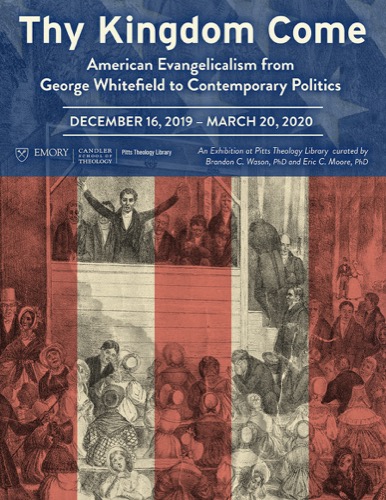Thy Kingdom Come:
American Evangelicalism from George Whitefield to Contemporary Politics

Introduction
"Hasten, O LORD, that blessed Time, and let thy Kingdom come!"
These are the words that George Whitefield penned upon seeing the Savannah River in America for the first time. Originally from Gloucester, England, George Whitefield became a household name in the American colonies. Whitefield earned the title the Grand Itinerant for his eloquent sermons, which drew large crowds throughout the colonies. His role in the Great Awakening and the impact he had on the shaping of America’s religious landscape makes him one of the founders of American evangelicalism.
The exhibition begins with Whitefield and the Great Awakening in the eighteenth-century and traces evangelicalism through the 250 years following Whitefield’s death, while contextualizing the history, beliefs, and diversity of the evangelical movement. Evangelicalism is characterized by a highly participatory expression of religion conveyed through personal conversion, revival, fundamental beliefs, and strong convictions about God and nation. However, defining evangelicalism is fraught with obstacles due to historical shifts in the movement and the different methodologies used to produce those definitions. The curators of this exhibition have problematized monolithic portrayals of evangelicalism in the media in order to demonstrate the significant role this movement has played within the broader American culture.
Virtual Tour of the Exhibition
Thomas Kidd Lecture
 Thomas S. Kidd is Distinguished Professor of History, James Vardaman Endowed Professor of History and Associate Director, Institute for Studies of Religion at Baylor University. Professor Kidd specializes in eighteenth-century North America and the history of American evangelicalism. He is the and the author of numerous books, including, America’s Religious History: Faith, Politics, and the Shaping of a Nation (Zondervan, 2019); Who Is an Evangelical? The History of a Movement in Crisis (Yale, 2019); Benjamin Franklin: The Religious Life of a Founding Father (Yale, 2017); and George Whitefield: America’s Spiritual Founding Father (Yale, 2014).
Thomas S. Kidd is Distinguished Professor of History, James Vardaman Endowed Professor of History and Associate Director, Institute for Studies of Religion at Baylor University. Professor Kidd specializes in eighteenth-century North America and the history of American evangelicalism. He is the and the author of numerous books, including, America’s Religious History: Faith, Politics, and the Shaping of a Nation (Zondervan, 2019); Who Is an Evangelical? The History of a Movement in Crisis (Yale, 2019); Benjamin Franklin: The Religious Life of a Founding Father (Yale, 2017); and George Whitefield: America’s Spiritual Founding Father (Yale, 2014).
J.E.S.U.S.A. Screening
Pitts Theology Library was excited to host an advance film screening of J.E.S.U.S.A. along with a videoconference introduction by the film’s writer and director, Kevin Miller. J.E.S.U.S.A. is an in-depth exploration of the relationship between Christianity and American nationalism and the violence that can often emerge from it. Far from a new phenomenon, this documentary traces the co-opting of Christianity by the state all the way back to when the Christian faith became the official religion of the Roman Empire.
Through interviews with a diverse group of scholars, pastors, historians, and activists, this film shows how specific readings of the Bible have led many Christians to confuse their devotion to Jesus with their dedication to the state. The film helps viewers rediscover and restore long-held Christian beliefs regarding nonviolence, inspiring Christians to become purveyors of peace rather than enablers of conflict and violence.

Exhibition catalog: Read Online | Download PDF